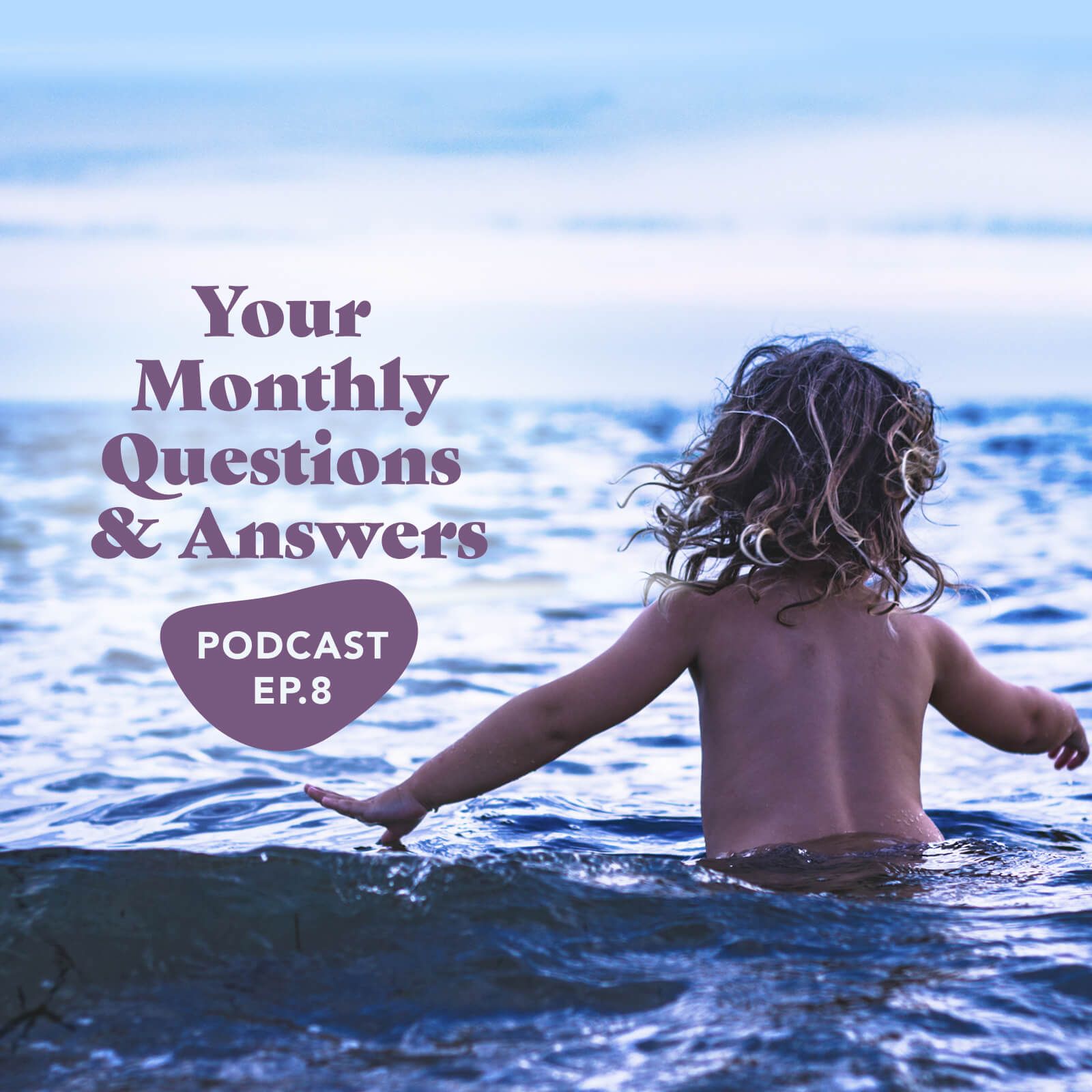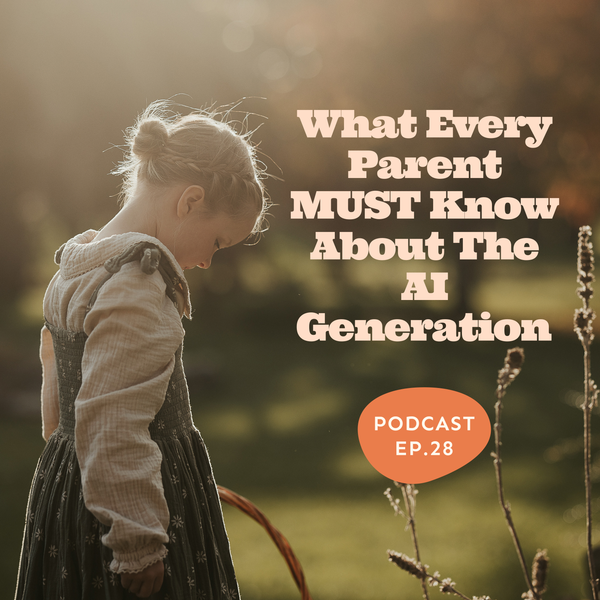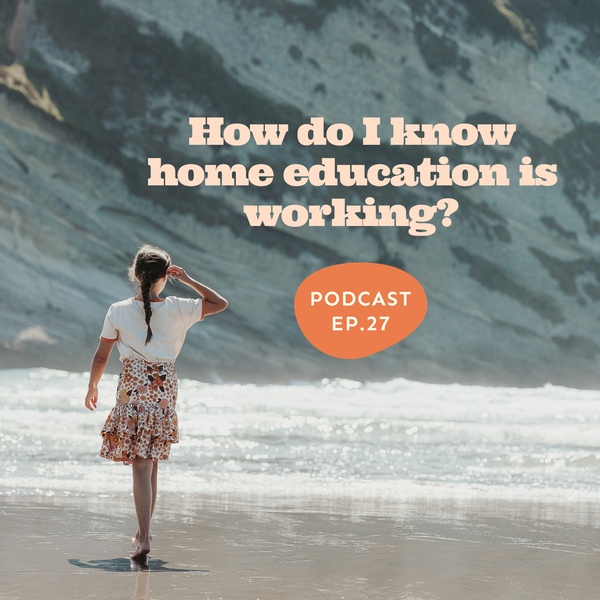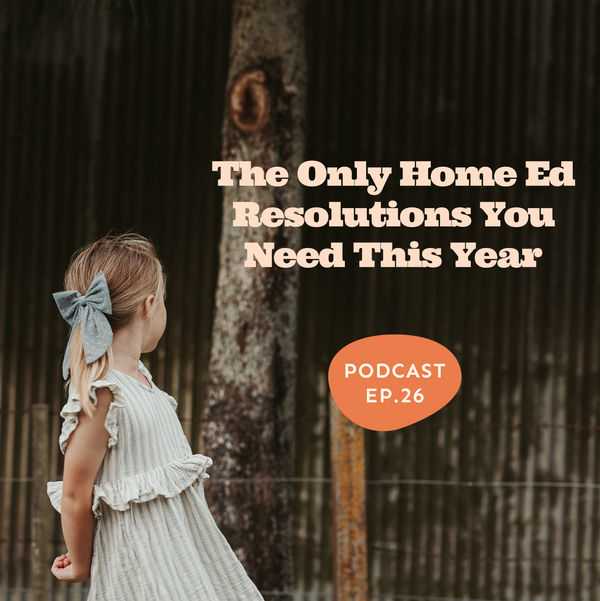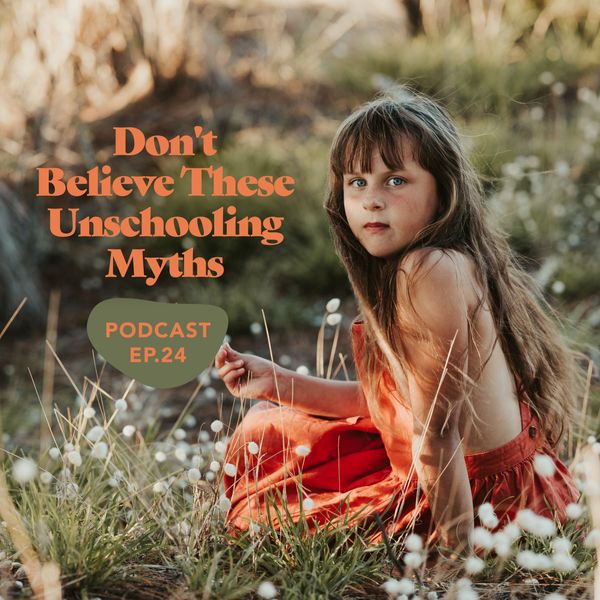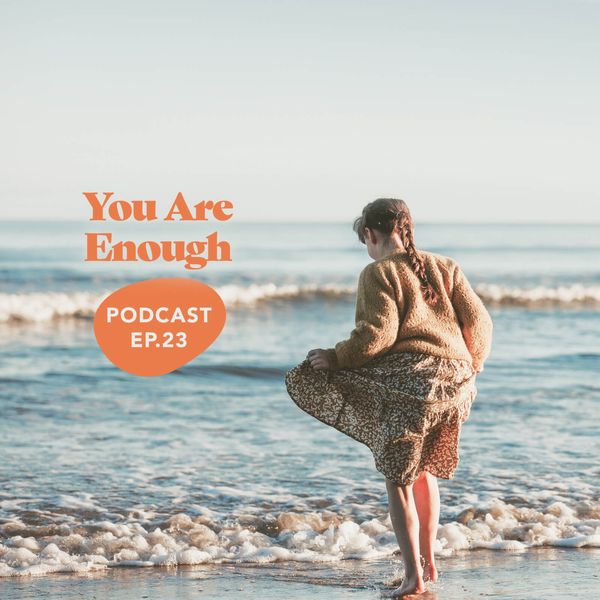In this – the first of many episodes where I’ll spend some time answering listener questions – I talk through:
1) How do you respond to people saying ‘life is hard – if you don’t force your child to do things they don’t want to do, how will they be prepared for life’?
2) How on earth do you ever find time for yourself, and your own interests?
3) How do I get my husband to see how beneficial home education can be?
Let’s get into it.
These private episodes go even deeper, backed by research, the science of how children learn and grow, and more than a decade of lived home educating experience. Each one is designed to help you rethink, reframe, and recalibrate the way you're walking this path, giving you the confidence to live the version of life you want. The Collection is 23 episodes strong and counting, with over 10 hours of listening available right now.
As a subscriber, you'll also get immediate access to my self-paced course, expert-led masterclasses recordings, five downloadable guides, our school exemption documents, and more 💛
Complete Transcript
INTRO
Helloooo and welcome to the Life Without School podcast, here to help you and your children live the life you want to, not just the one you’re told you should.
I’m Issy, a writer and unschooling dad from New Zealand.
You can find more about me at starkravingdadblog.com, as well as collections of my favourite posts bundled up into encouraging little guidebooks for anyone walking this road less travelled.
Thank you so much for tuning in to listen today. Alright, let’s get into this week’s episode.
MUSIC
Hello, and welcome to an episode that will be a little bit different this week. If you follow me on Facebook and Instagram, you would have seen me post a callout for questions to talk through today. Like I said in that post – I’m sent questions all the time, and while I answer them as best I can…there’s just nothing quite like talking through something properly. So – that’s what this week’s episode will be. Three of the most asked questions on that post, with some good time and space for each. I’m thinking of doing one of these Q&A episodes each month, so if you find it useful – please leave a review or pop me a message letting me know!
The three questions I’ll be talking through today are:
1) How do you respond to people saying ‘life is hard – if you don’t force your child to do things they don’t want to do, how will they be prepared for life’?
2) How on earth do you ever find time for yourself, and your own interests?
3) How do I get my husband to see how beneficial home education can be?
I actually get the feeling all three of these will become their own episodes at some point, but we’ll make a pretty good start on them today. A start that – you should always remember – is based purely on my own experiences, and opinions, and life circumstances, and worldviews. Nothing is ever black and white, so please don’t take my answers to these questions as being right. They are just my thoughts. They are careful, considered, caring thoughts, I can promise you that. But…they are just my thoughts nonetheless.
Before we get into these questions, I want to say a huge, huge thank you to everyone who has supported my work with a donation over the past week. I have been blown away by how many of you have decided what I’m doing here deserves your support, and…honestly…it feels almost overwhelming. The best part has been reading the notes you’ve been including, like this one from Knapp in Australia which captured the sentiment of what so many of you said:
“Thank you for giving me the confidence to trust my children. They are perfect just as they are and I now practice walking NEXT to them in life, marvelling at how amazing they are!”
I…sat and read that over and over when it came through. Because…that’s it. That’s everything. Trusting our children, and getting to walk alongside them as they grow. We put a lot of layers over the top of life, but I can’t think of a better description of the best possible home education foundation. Thank you, again, to all of you who have supported my work. If you’d like to make a one-off donation, you can do that in an easy, fast, secure way right on my website. I’ll link directly to it in the show notes for you.
Ok we have three super interesting questions to dig into, so let’s do this:
MUSIC
Question One: How do you respond to people saying ‘life is hard – if you don’t force your child to do things they don’t want to do, how will they be prepared for life’.
Phwoar, there’s a bit that sits under this:
Firstly, this idea that I had it hard, and I turned out alright, you should go through that too. I don’t believe that’s good, or strong. I believe it’s dangerous. I believe it’s creating cycles of pain within families that – with the right kind of personal work – can be broken. If you think this way, I encourage you to listen to the answer I give about dads later in this episode and reflect on any unhealed, personal wounds you just haven’t sat with and worked on. Because I guarantee you’ll find some there.
Secondly, and something I find equally dangerous, is this idea that life has to be full of hard things. Yes, life can be hard. Yes, it will throw challenge after challenge at you. But so many of the things we actually talk about as being hard when it comes to school – things like, putting up with a bad teacher, or a bully, or assignments that don’t work how your brain does…none of those things transfer to the ability to navigate true, rewarding life challenges. They don’t prepare us to go through hard things, they condition us to accept what should be unacceptable. The bad teacher becomes a bad boss, the playground bully becomes a toxic colleague, the boring, unfulfilling assignments become a boring unfulfilling job. We shouldn’t be hardening ourselves up so we can get through those things. We should be developing the skills to recognise that they’re unhealthy to us, and that – for most people in most situations – we actually have a fair amount of power to change them.
Thirdly – and probably most importantly – is the fact we confuse resilience with hardness. We confuse being capable of navigating a difficult situation, with putting up with an unhealthy one.
This is something I heard a lot when we first started down this path, because we originally chose to leave the school system because we believed our then 7-year-old was suffering in the classroom. And that was met with a lot of backlash from people we spoke to.
We were being too sensitive to our children’s discomfort. Spending time in that was good for them, and good for us. Pushing through it would bring us all some much-needed resilience.
I heard it so much that for a while I felt embarrassed by the sensitivity I held around all this, especially as a dad. I knew it was just who I was, but I started to believe it was a weakness. One I was transferring onto my children by trying to protect them from emotional strain. One that would cause them to miss out on the important developmental stage of learning to wipe away their tears, put their heads down, and push through whatever was causing them pain.
The thing is, I’m absolutely a firm believer in helping my children develop resilience. In helping them work through hard things. In accepting when something doesn’t go their way. In not sweating the small stuff.
But what I don’t believe is that pushing through things like severe separation anxiety or bullying will help a child develop a resilient character. I believe pushing through that sort of strain will only develop the skill of hardening your heart. Of shutting off access to your softness as an emotional preservation tool.
I said earlier that most of what I’m talking about today is just my opinion, but this is more than that. Because it is a psychological fact that being continually stressed doesn’t develop resilience, it eats away at it.
I have long since moved past feeling any shame about my sensitivity. In fact, I’ve embraced it. I’m sensitive. I’m soft. And I will absolutely step in and protect my children from any serious emotional strain they’re experiencing whenever I can, for however long I can.
Resilience is a wonderful trait, but we should never confuse it with a heart that has become hard.
Before I move on from this question, I want to quickly talk about this idea of independence – because, I think it’s closely tied to resilience. How can our children ever go through hard things if we keep them so close, right?
Well, yes, we spend a lot of time together, and we’re very connected in ways that others might call dependence. Our recently turned 7 year old climbs into bed with us to fall asleep almost every night. Our 11 year old likes us to stay parked nearby when we drop him at places like drama class or sports practice. Our 14 year old calls us ‘mummy and daddy’, not ‘mum and dad’.
You can call that dependence, with a negative tone. Or you can call that connection. You can say these children need to grow up a bit, harden up a bit, or you can see their dependence as a healthy part of a child’s development. As laying a stronger foundation for later. As something they’re part of building and preparing for, not something that’s forced on them before they’re ready.
The great irony in the idea that children need to become independent and resilient is that when we force those things too soon they don’t. They harden themselves, yes. They find ways to protect themselves, yes. But that is not true, confident independence. It is self-defence. It is self-preservation.
Again, I think the real issue is not that homeschooled children aren’t learning to be resilient and independent of their parents. It’s that we’re confusing all that with hardness and detachment.
So does it matter to me that my children are still dependent within our family unit, and likely will be for some time yet? No.
What would matter to me is if they weren’t.
MUSIC
Question Two: How do you find time for yourself, and your own interests?
I really love that a bunch of you asked this question, because I don’t think it’s talked about enough. Not, openly at least. I think that might be because, often, we feel like if we do we’re betraying the everything’s-great image of homeschooling we think we need to. We often spend so much time defending our choice to live this version of life, that it can feel like we’re just handing any doubters the opportunity to say ‘see, I told you it wasn’t a good idea’.
But, it’s really important to be able to say this path is hard. To be open about that, and to share it with each other. Just because something’s hard doesn’t mean it’s not right, or good. In fact those things often go hand in hand.
Taking on almost complete educational and life mentoring responsibility for your child is a huge commitment. It really is. For many families it often means giving up an income, or a potential income. It often means things you might want to do personally are de-prioritised. Pushed down the line until you have more time, or even put on ice forever.
And it almost always means you will have less personal space, and less of your own thoughts.
There are life seasons where this path feels totally manageable, and others when it feels completely overwhelming. So back to the question, and how I think I can help with all this.
Well, I actually don’t think I can. Bit of an anticlimax? Maybe.
But…every one of you is going to have a different life setup. Some of you will have easy access to your own time and space, through things like family who live close by and want to be involved, and some of you won’t. Some of you will have a partner in crime on this home eduction mission, and some of you won’t. Some of you will have trusted friend networks for your kids, that give you options like taking turns on sleepovers, and some of you won’t. So, I just don’t think giving universal advice is going to be helpful here.
I can share what that looks like in our family, of course, if that helps. My wife and I are fortunate enough that we’re a team on this – not all day every day, not by a long shot, I work a lot of hours so Kate flies solo on a lot during the week – but we understand – deeply – that need for some personal space. Both physical and mental. We actually hardly ever have the opportunity to spend any real time as just the two of us, so we fail pretty hard at getting that quality time together. But we are good at lifting for each other so we at least get pockets of that individual space here and there.
For me, that’s making sure Kate has the time for a walk or jog on her own most days, blasting music and clearing her head and having some of her own thoughts. For her, it means running point across allll the hours I spend writing, and editing, and recording, and replying to messages and emails. What I do here, the level of work I put in each week, is bigger than a normal full-time job, and she makes sure I can keep serving this community by holding that space.
If it wasn’t for Kate, this podcast wouldn’t exist.
Aside from that, I really need physicality to be happy – so for that one, I actually combine it with the kids. We all do karate twice a week, and when we walk into that dojo…we line up, and it’s just me. Someone else takes over the responsibility of my children, and I have 60-90 minutes of a very physical, very personal journey that’s just mine.
But these are purely practical things that apply to us and our life. Not yours. So I think the most important thing here is just recognising that while this path is incredibly rewarding, it’s equally demanding on time, energy and head space. It’s doing whatever we can to find the space we need to refuel our tanks whenever, and however, we can. It’s being brave enough to ask the people around us for help, understanding that that is not a weakness. It is a strength. It is a muscle that our children need us to keep strong, to keep using, even when it feels harder than ever.
Because, as we all know – you cannot pour from an empty cup. Do everything you can, with help from anyone you can lean on, to find those little ways of topping it up.
MUSIC
Question Three: How do I get my husband to see how beneficial home education can be?
sigh
I’m sighing about this question for two reasons. Firstly, because it frustrates me that most dads – and, I really do mean most dads – still seem so reluctant to open their eyes to different life options for their children. But I’m also sighing because I get it. Most dads – and again, I mean most – just want the best thing for their child. They want them to get the best education, and the best social experiences, and the best opportunities, and the best possible career…they mean so well.
But the great irony with so many dads, is that their stubbornness against being open to this way of life, their reluctance to spend the time and energy on researching all the different possible life paths for their children, is actually preventing them from finding – and being able to provide – all of those bests they so dearly want for their children.
So, if they’re so well meaning, as I believe they are, why will they not invest the time and energy into learning more?
Well, as a dad myself, I think I know why. It’s two main things:
1) The first one is the fear of social stigma. The perception of your child – and, by extension, yourself – by your friends, family and the world in general. When your child goes to school, they – and you – are just like everyone else. You live all the same experiences, and get to talk about all the same stuff everyone else does. Your child with other children, and you with other adults.
But when your child doesn’t go to school…you suddenly lose that common ground. Instead of joining in on those conversations, you find yourself having to explain why you can’t. And – because home education is still so completely misunderstood – that explanation is never met with any real understanding.
And so you kind of sit on the outside of any office, or workplace, or social chatter that’s related to that – which, you discover quite quickly when you’re no longer part of it, is actually a lot. School is just such a foundation thread of society.
In the nine years since my eldest son turned five – which is school age here in NZ – I’ve worked for three different companies, with hundreds of different people, and a grand total of zero other home educating parents. That I knew of, at least. Zero.
It doesn’t matter how strong you are in your convictions, or how ready you are to explain why you’ve chosen the path you’ve chosen, that is not an easy environment to be bold in. And I think this is what dads picture when you try and talk to them about a different life path for your child, or when you send them a post to read, or when you hand them one of my little guides. It’s not that they don’t want to do the research – most dads I know are all about the hard data – it’s that they don’t want to carry the weight of that social stigma. For them, or their child.
Dads – I need to tell you that I get that. It can feel scary, and isolating, and lonely. I have lived it, and felt it, for years. But if feeling those things – if taking that on – means your child, because of who they are and how they’re wired, will have a better life if you do…then you need to do it.
The second thing that feeds this reluctance is the potential – no, likely – recognition that their own school experiences might not have been as positive or necessary as they’ve convinced themselves they were. It cannot be – statistically, it just cannot be – that all these dads had such wonderful experiences at school that they don’t want their child to miss out on them. It is far, far more likely that most of these dads are repressing memories from a time of their life that was actually really difficult.
About one in every 20 children will be diagnosed with ADHD at some stage of their schooling life. But for every girl that’s diagnosed, there will be between three and seven boys. For every one might-be-a-future mum diagnosed, there will be between three and seven might-be-a-future-dads. A typical classroom is a very difficult place to spend time with something like ADHD, and this is just one example, of one condition.
Statistically, a lot more dads will have struggled at school than mums.
When I released the first episode of this podcast, I was sent a message from a mum who had sat down and listened to it with her husband. A man who has never cried about anything, I’m told. As he listened to the story of my difficult school years, tears filled his eyes. He’d had the same kind of experience, and – for the first time in possibly a very long time – he truly let himself recognise that.
Letting yourself feel these things, especially if you spend a bit of time there and really reflect, can be confronting and painful. It can stir up memories of experiences with a bad teacher or a playground bully, or it can go down way deeper. Right down into things like shame and embarrassment at not being able to keep up in a class or subject, or the crippling stress that comes, for so many, with assessments and tests and grades, or the loneliness that so many experience during a lunch hour that can feel like an eternity.
There are…so many feelings to be processed, when you really start reflecting. It’s hard, confronting work. But, for your child’s sake, it may just be the most important work you ever do.
Guys, I know this stuff is hard. I know it can dredge up painful experiences you’d rather not go back to. Or, even be honest with yourself about. I know it can be socially confronting to sit through workplace chat about everyone’s relief at the school holidays ending, knowing there’s just no way you can join in on that conversation. I know how overwhelming it can feel to continually have to explain why you’ve decided to walk a different path to almost everyone you know and ever meet. Trust me, I do. I have felt all of this, and I have lived all of this. As a child, and as an adult.
But your children need you. They need you to be open, to spend the time and energy they deserve on researching and deciding whether school truly can provide them the best path through life. Because if it won’t, they need you to smash open the door to a new one. They need you to pick up that weight and carry it on your shoulders. They need you to be bold. They need you to be strong.
They need you to be their hero.
MUSIC
If any of these questions have been on your mind, I hope this little chat has given you some fresh perspective. Some new angles for you to look at things from, and process your own unique life circumstances against.
The thing that’s stuck with me the most – and, honestly, I just can’t stop thinking about it – is how common the reluctant dad scenario seems to be. How so many dads seem unable to…open their heart so they can really hear what their children need. And, like I said earlier, I really do understand. There’s a whole big soup mix of emotions, and fears, and well-intentioned protectiveness in there. But, at the same time, so many children’s – and future adults – lives could be changed for the better if more dads could find a way to open up. Clearly, I have some work to do here.
And for all of you struggling to find some time and space to just be you – to have some of your own thoughts, and time to breathe – keep looking for ways to ask for the help you need, as often as you can. I know that’s not always possible, but no one is winning when your cup is empty. At the very least, though, know that you’re not alone. There are so, so many of us going through seasons of feeling like our batteries are flashing red, with no way to re-charge them but – for the sake of our children – we’re finding ways to keep going anyway. I know one day our children will look back in wonder at how we all did this with so little support and understanding from society in general. And maybe, if enough of us can keep pushing against that strong current, we will start to turn it. And our children, and their children, won’t find this path so hard.
Thank you, as always, for listening. I’ll see you back here soon.
Bye for now.


